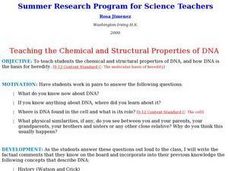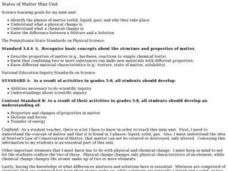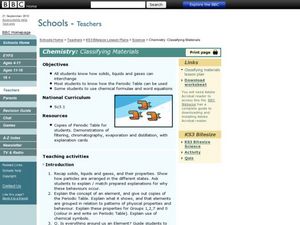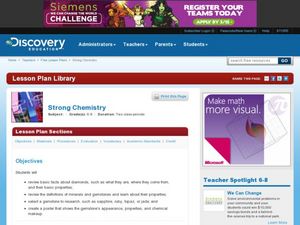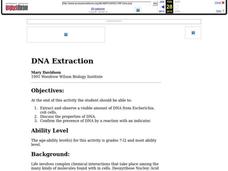Curated OER
One for the Money
Eighth graders sort items as they are shown one at a time by the teacher. They attempt to identify the one physical trait the teacher is looking for (metal and not metal). After several objects have been shown and placed in groups, the...
Curated OER
Comparison of Different Methods for Determining Stream Flow at a Stream Site
Students make measurements and calculations to determine the stream flow of an outdoor stream site. In this stream characteristics lesson, students travel to a field site to construct a transect across a stream and measure the...
Curated OER
What is Soap?
Students investigate soap, how it is made and its structure. In this soap lesson, students observe a demonstration of soap being made. Students observe the properties of soap and how soap performs in "real-life" situations like cutting...
Curated OER
Mixtures of Matter
Students experiment with solids and liquids. In this mixtures of matter lesson, students combine matter to form solutions. Students hypothesize, test, and analyze the data to draw conclusions. The lesson can be extended by having...
Curated OER
Polymer Chemistry: More than Just Plastic
Fifth graders examine polymers and how they are formed. In this chemistry lesson plan students complete their own polymer experiment then discuss what they learned.
Curated OER
Teaching the Chemical and Structural Properties of DNA
Students work together to answer questions about DNA. They identify where DNA is found and its function in the cell. They note any physical similarities they have with their family members
Curated OER
Chemistry Practice
In this chemistry practice worksheet, students select the correct response to the given questions. Students apply knowledge about the states of matter, finding vapor pressure and atmospheric pressure.
Curated OER
Food or Fuel?
High schoolers describe the process of transesterification utilizing chemical formulas. They construct and compare models of chemical structure of the substances involved in biodiesel production such as: alcohols, alkenes, alkanes,...
Curated OER
States of Matter Mini-Unit
Students identify he phases of matter (solid, liquid, gas), and why they take place. They comprehend what a physical change is and what a chemical change is. Students know the difference between a Mixture and a Solution.
Curated OER
Chemistry: Classifying Materials
Young scholars classify materials. In this chemistry lesson, students examine the properties of solids, liquids, and gases. Young scholars discover the elements, compounds, and chemical symbols.
Curated OER
Changes In Matter, "The Big Chill"
Third graders investigate why ice cream does not go through any chemical changes when it is exposed to physical changes. They describe the three states of matter in either written or verbal form. Then students experiment with ice cream...
Curated OER
Oil Embargo!
Ninth graders generate and analyze data to determine which and how much of two polymers best absorb oils, formulate procedure to accurately determine how many times its own weight particular polymer can absorb, and develop understanding...
Curated OER
Strong Chemistry
Young scholars research and create a poster about a gemstone. In this mineral properties lesson, students view a video about diamonds. They discuss the properties of minerals and choose a gemstone to research and create a poster.
Curated OER
Solid, Liquid, Gas!
Students determine the properties of the solids, liquids, and gases, and how they can recognize those properties by observing a teacher demonstration. Next, they experiment with at mystery matter that looks like a liquid but that takes...
Curated OER
Mighty Minerals
Students investigate the physical and chemical characteristics of minerals. They make a list of the uses of minerals found in Illinois. They write a report individually based on their observations.
Curated OER
The Wonderful World of Polymers
Seventh graders investigate the concept of polymers. They discover unique properties and how polymers are natural. The lesson contains sufficient background information for the teacher. Students examine different types of materials and...
Curated OER
Paper Chromatography
Students use this design the illustrate how ink can be separated into its component chemicals using paper chromatography. They use five unknown samples of ink on pre-labeled chromatography strips are provided to students. Students use...
Curated OER
Applying Scientific Method to Analyzing
Students review the scientific method and basic lab skills, and practice how chemical employees work in teams to follow the scientific method. Students learn about various job requirements and responsibilities in the chemical industry.
Curated OER
Cell physiology and chemistry
Young scholars design an experiment to discriminate between chemical diffusion, osmosis, facilitated diffusion and active transport through a membrane. Be specific about predictions and interpretations!
Curated OER
Mining Minerals
Students define the properties of minerals and their uses in their world. In this multi-lesson unit, students contribute actively to discussions of mineral mining, mining methods and mine safety. A role play lesson asks students to...
Curated OER
DNA Extraction
Students are able to extract and observe a visible amount of DNA from Escherichia coli cells. They discuss the properties of DNA. Students confirm the presence of DNA by a reaction with an indicator.
Curated OER
Ice Cream Blizzards
Fourth graders explore whether the making of homemade ice cream is a physical change or a chemical change in a lab experiment. Students identify states of matter, describe the physical properties of states, and collect temperature data...
Curated OER
Mystery Paint
Students use the scientific method to determine the properties of various kinds of paints, use collected data to identify paint samples that are not properly labeled and use proper science safety techniques while working with chemical...
Curated OER
Combustion Reactions
Students write a balanced chemical reaction. They articulate how burning fossil fuels increase the carbon dioxide levels in the atmosphere. Students incorporate all the environmental risks involved as well.
Other popular searches
- Chemical Properties of Water
- Chemical Properties/changes
- Physical Chemical Properties
- Chemical Properties of Rocks
- Simple Chemical Properties
- Chemical Properties of Matter





